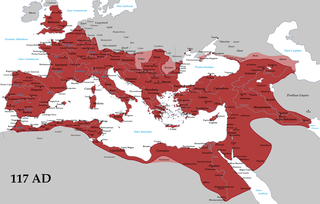Related Research Articles

The Roman Empire was the post-Republican state of ancient Rome. It is generally understood to mean the period and territory ruled by the Romans following Octavian's assumption of sole rule under the Principate in 27 BC. It included territories in Europe, North Africa, and Western Asia and was ruled by emperors. The fall of the Western Roman Empire in 476 AD conventionally marks the end of classical antiquity and the beginning of the Middle Ages.

Roman law is the legal system of ancient Rome, including the legal developments spanning over a thousand years of jurisprudence, from the Twelve Tables, to the Corpus Juris Civilis ordered by Eastern Roman emperor Justinian I. Roman law forms the basic framework for civil law, the most widely used legal system today, and the terms are sometimes used synonymously. The historical importance of Roman law is reflected by the continued use of Latin legal terminology in many legal systems influenced by it, including common law.

The Third Punic War was the third and last of the Punic Wars fought between Carthage and Rome. The war was fought entirely within Carthaginian territory, in what is now northern Tunisia. When the Second Punic War ended in 201 BC one of the terms of the peace treaty prohibited Carthage from waging war without Rome's permission. Rome's ally, King Masinissa of Numidia, exploited this to repeatedly raid and seize Carthaginian territory with impunity. In 149 BC Carthage sent an army, under Hasdrubal, against Masinissa, the treaty notwithstanding. The campaign ended in disaster as the Battle of Oroscopa ended with a Carthaginian defeat and the surrender of the Carthaginian army. Anti-Carthaginian factions in Rome used the illicit military action as a pretext to prepare a punitive expedition.

Gaius Cassius Longinus was a Roman senator and general best known as a leading instigator of the plot to assassinate Julius Caesar on 15 March 44 BC. He was the brother-in-law of Brutus, another leader of the conspiracy. He commanded troops with Brutus during the Battle of Philippi against the combined forces of Mark Antony and Octavian, Caesar's former supporters, and committed suicide after being defeated by Mark Antony.

The Romano-British culture arose in Britain under the Roman Empire following the Roman conquest in AD 43 and the creation of the province of Britannia. It arose as a fusion of the imported Roman culture with that of the indigenous Britons, a people of Celtic language and custom.

Constantius III was briefly Western Roman emperor in 421. He earned his position as Emperor due to his capability as a general under Honorius, achieving the rank of magister militum by 411. That same year, he suppressed the revolt of Constantine III, a Roman general who had declared himself emperor. Constantius then went on to lead campaigns against various barbarian groups in Hispania and Gaul, recovering much of both for the Western Roman Empire. Constantius married Honorius's sister Galla Placidia in 417, a sign of his ascendant status, and was proclaimed co-emperor by Honorius on 8 February 421. He reigned for seven months before dying on 2 September 421.

The Gallic Wars were waged between 58 and 50 BC by the Roman general Julius Caesar against the peoples of Gaul. Gallic, Germanic, and Brittonic tribes fought to defend their homelands against an aggressive Roman campaign. The Wars culminated in the decisive Battle of Alesia in 52 BC, in which a complete Roman victory resulted in the expansion of the Roman Republic over the whole of Gaul. Though the collective Gallic armies were as strong as the Roman forces, the Gallic tribes' internal divisions eased victory for Caesar. Gallic chieftain Vercingetorix's attempt to unite the Gauls under a single banner came too late. Caesar portrayed the invasion as being a preemptive and defensive action, but historians agree that he fought the wars primarily to boost his political career and to pay off his debts. Still, Gaul was of significant military importance to the Romans. Native tribes in the region, both Gallic and Germanic, had attacked Rome several times. Conquering Gaul allowed Rome to secure the natural border of the river Rhine.

The final battles of the European theatre of World War II continued after the definitive surrender of Nazi Germany to the Allies, signed by Field marshal Wilhelm Keitel on 8 May 1945 in Karlshorst, Berlin. After German leader Adolf Hitler's suicide and handing over of power to grand admiral Karl Dönitz in May 1945, Soviet troops conquered Berlin and accepted surrender of the Dönitz-led government. The last battles were fought on the Eastern Front which ended in the total surrender of all of Nazi Germany’s remaining armed forces such as in the Courland Pocket in western Latvia from Army Group Courland in the Baltics surrendering on 10 May 1945 and in Czechoslovakia during the Prague offensive on 11 May 1945.

White flags have had different meanings throughout history and depending on the locale.

Citizenship in ancient Rome was a privileged political and legal status afforded to free individuals with respect to laws, property, and governance. Citizenship in Ancient Rome was complex and based upon many different laws, traditions, and cultural practices. There existed several different types of citizenship, determined by one's gender, class, and political affiliations, and the exact duties or expectations of a citizen varied throughout the history of the Roman Empire.

Asia was a Roman province covering most of western Anatolia, which was created following the Roman Republic's annexation of the Attalid Kingdom in 133 BC. After the establishment of the Roman Empire by Augustus, it was the most prestigious senatorial province and was governed by a proconsul. That arrangement endured until the province was subdivided in the fourth century AD.

Doctors' Commons, also called the College of Civilians, was a society of lawyers practising civil law in London, namely ecclesiastical and admiralty law. Like the Inns of Court of the common lawyers, the society had buildings with rooms where its members lived and worked, and a large library.
The ius gentium or jus gentium is a concept of international law within the ancient Roman legal system and Western law traditions based on or influenced by it. The ius gentium is not a body of statute law nor a legal code, but rather customary law thought to be held in common by all gentes in "reasoned compliance with standards of international conduct".

The Constitutio Antoniniana, also called the Edict of Caracalla or the Antonine Constitution, was an edict issued in AD 212 by the Roman emperor Caracalla. It declared that all free men in the Roman Empire were to be given full Roman citizenship.

Surrender, in military terms, is the relinquishment of control over territory, combatants, fortifications, ships or armament to another power. A surrender may be accomplished peacefully or it may be the result of defeat in battle. A sovereign state may surrender following defeat in a war, usually by signing a peace treaty or capitulation agreement. A battlefield surrender, either by individuals or when ordered by officers, normally results in those surrendering becoming prisoners of war.
Cessio bonorum, in Roman law, is a voluntary surrender of goods by a debtor to his creditors. It did not amount to a discharge unless the property ceded was sufficient for the purpose, but it secured the debtor from personal arrest. The creditors sold the goods as partial restoration of their claims. The procedure of cessio bonorum avoided infamia, and the debtor, though his after-acquired property might be proceeded against, could not be deprived of the bare necessaries of life. The main features of the Roman law of cessio bonorum were adopted in medieval law, Scots law, and also in French law.
In the context of war, perfidy is a form of deception in which one side promises to act in good faith with the intention of breaking that promise once the unsuspecting enemy is exposed.

The Pakistani Instrument of Surrender was a legal document signed between India and Pakistan to end the Bangladesh Liberation War and the Indo-Pakistani War of 1971. Per the trilateral agreement, the Pakistani government surrendered the Armed Forces Eastern Command, thereby enabling the establishment of the People's Republic of Bangladesh over the territory of East Pakistan. The document was signed by Jagjit Singh Aurora and Pakistan's A. A. K. Niazi, who corroborated the surrender of 93,000 Pakistani soldiers — the world's largest surrender in terms of number of personnel since World War II. Despite the agreement, Pakistan did not formally recognize Bangladeshi sovereignty until February 1974.

The Laconian War of 195 BC was fought between the Greek city-state of Sparta and a coalition composed of Rome, the Achaean League, Pergamum, Rhodes, and Macedon.
Events from the year 1653 in Ireland.
References
- ↑ Alan Watson, Roman Law & Comparative Law (London: University of Georgia, 1991), 75.
- ↑ Frier, Bruce W.; McGinn, Thomas A. (2004). A Casebook on Roman Family Law. Oxford University Press. p. 292. ISBN 978-0-19-516185-4.